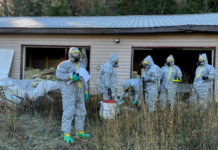Waterloo Regional Police Chief Bryan Larkin is warning that rural communities are being impacted by an uptick in crime and addiction since the onset of the coronavirus pandemic.
Larkin made the comments during a media roundtable on Tuesday morning.
“The first 90 days from March through to early June, no doubt, we saw a significant decline in crime, significant decline in calls for service. And we essentially saw our citizens very much obeying community lockdowns by local public health orders, by provincial orders,” said Larkin about crime in the region.
“Now, as we’ve traversed out of that, and even though we’re in the second wave of the pandemic, most recently our call volume has increased to normalized levels. Crime, and in particular violent crime, is something that we’re dealing with.”
The Waterloo Region saw 12 violent shootings in 2020, a majority of which were in Kitchener.
In 2019, the region reported 780 overdoses, 63 of which were fatal.
According to Larkin, the problem is not only isolated to city centres and urban areas but has negatively impacted nearby rural communities.
“…the challenges of addiction go beyond any specific boundary. They go beyond any special specific neighborhood – opiate addiction doesn’t discriminate. So we’re seeing it impact the rural communities, we’re seeing rural communities in many ways becoming more dense,” said Larkin.
“We need to be vigilant. We need to actually make sure that we report crime in rural communities. It’s easier if you’re in Elmira, Baden, New Hamburg because it’s more neighborhood-centric, it’s a little more difficult than some of the rural areas where your neighbour may be a concession down the road.”
According to health experts, northern and rural Ontario communities are struggling to deal with the opioid epidemic due to a lack of access to services and slow response times.





















